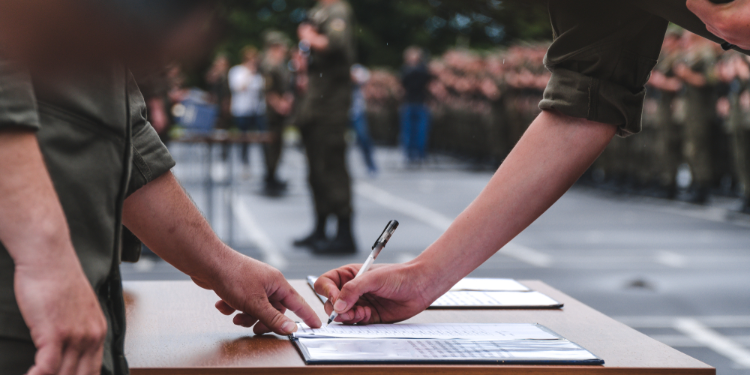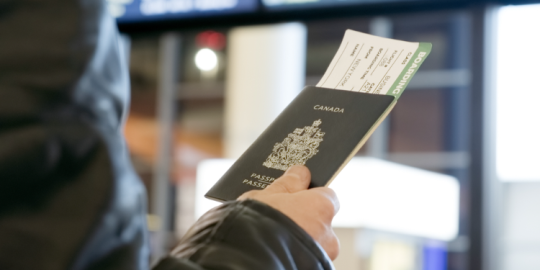Green Card holders can enlist in the US Military
Only foreigners who are permanent residents of the United States, i.e., hold a Green Card and are currently living in the country, can enlist in the American armed forces. While they can be rank-and-file soldiers, they cannot be promoted to higher positions. That is, they cannot become officers prior to naturalization.
The minimum age requirement is 17, with applicants under 18 naturally requiring parental consent. The maximum age limit depends on the branch, but it ranges between 28 (Marines) and 39 (Air and Space Force). You must at least have a high school diploma and must take two tests: the English Comprehension Language Test and the Armed Services Vocational Aptitude Battery (ASVAB). The ASVAB is a multi-aptitude test for your math, language and logic skills. It's like a military equivalent of the SATs or GRE.
Military service makes US naturalization easier. If you've served in the US military for at least 1 year, even during peacetime, you can apply for citizenship under the INA 328 provision of the Immigration and Nationality Act. About 5,000 legal residents enlist in the armed forces every year.
Moscow is looking for more foreign recruits who speak Russian
Back in 2015, President Putin had eased the recruitment of foreigners into the Russian Armed Forces. It allowed non-Russians between the ages of 18 and 30 to sign a 5-year contract with the Russian Armed Forces, provided that they speak Russian and have no criminal record. Foreign recruits can even be posted abroad during wartime.
This decree largely targets citizens of the former Soviet bloc, many of whom speak Russian as a second language. Furthermore, Russia has large military bases in these countries, for instance, in Tajikistan and Armenia, which makes recruitment easier.
In 2022, as the Russian military struggles with its supply of manpower in the Ukraine war, Moscow has decided to amp up its efforts to attract foreign recruits. It is currently in the process of opening a special military recruitment center for foreigners at the migration center of Sakharovo. This center is in a suburb of the capital and is visited by many foreign nationals who need to get or renew their residency documents.
The Kremlin is also in the process of legislating a new bill that will allow foreigners who sign up for a 1-year contract (not 5-year contract, like prior to 2022) with the Russian Armed Forces to become naturalized citizens. They will be allowed to bypass other conditions of the Federal Law on the Citizenship of the Russian Federation.
Ukraine needs the assistance of foreign soldiers in the Russo-Ukrainian war
Just like Russia, Ukraine is also looking for more manpower in the ongoing war. In February 2022, President Zelensky created an International Legion to encourage foreign soldiers to join the Ukrainian army. The International Legion currently has about 20,000 members from 55 different countries. This legion has a website called Fight for Ukraine to help guide aspiring applicants.
To be eligible, applicants need to have prior combat experience. They must also be willing to bring their own equipment like clothing, body armor, load-bearing vests, helmets, etc. However, it's disrecommended to bring clothes with the insignia of their home country's army, as that will make them an easy target.
The steps are: apply through the Ukrainian embassy in your country or region, bring your documents (ID, passport, proof of military experience) to the embassy, be interviewed, submit a written application to enlist under a voluntary contract, travel to Ukraine in an organized way with the help of embassy representatives, join the International Legion of Defense of Ukraine at a collection point in the country, sign the contract there. Given the urgency of the situation, there are no visa requirements.
It's important to mention that the defense departments of various countries, even Ukraine's allies, have warned volunteers of the possible problems they could face. The UK's Home Office warns on its website that its citizens' actions in Ukraine could make them be prosecuted under criminal or terrorism laws when they return home. It also says that consular support, i.e., help from the state, in the war zone will be limited.
Citizens of Commonwealth countries can join the British Armed Forces
Citizens from the Commonwealth, the union of former British colonies, have some privileges in the United Kingdom. Notably, they can vote in the UK's parliamentary elections if they are residents, and they can enlist in the British Armed Forces.
Given the extent of Britain's former empire, this applies to citizens of 55 countries, including Australia, Canada, India, Sri Lanka, South Africa, Mauritius, Botswana, Belize and Jamaica, among countless others. Irish citizens are also exceptionally eligible even if their country has left the Commonwealth.
Due to the high backlog of applications, the British Armed Forces has temporarily suspended applications from overseas Commonwealth citizens. However, Commonwealth citizens who have been residents of the UK for at least 5 years can still apply. Overseas applications might open again in the future when there is a strong need for active military personnel, i.e., during times of war.
Applicants need to be aged between 16 and 49 (with parental consent for minors). Rank-and-file soldiers require no educational qualifications, but officers require GCSEs, which are equivalent to a high school diploma in most countries.
After serving for at least 4 years in the British Armed Forces, volunteers can apply for indefinite leave to remain in the UK. This is permanent residency under which they can work, study and get social benefits. As permanent residents, they can also apply for British citizenship, but they will not be fast-tracked for it.
The French ‘Légion Étrangère' is only for foreign military recruits
The French ‘Légion Étrangère,' or Foreign Legion, is unique in the world. It's the only surviving military branch dedicated to only foreign soldiers. It was created in the 19th century when France still had a vast empire.
It welcomes applicants from all over the world. Applicants from the European Economic Area only need their ID card to apply, whereas other candidates need a valid passport. They need to be aged between 17–39 (parental consent is required for minors). There are no education and French language requirements, and applicants only need to have basic literacy in any language. After being accepted, their military training will include intensive French classes.
The selection process cannot be done online: candidates need to show up in recruitment centers in metropolitan France, which are found in various major cities like Marseilles, Lille and Lyon. Their accommodation and food will be paid for by the French state during the selection process.
In 2022, 1700 new 'légionnaires' were accepted. Joining the Légion Étrangère truly speeds up naturalization. After only 3 years of military service, a 'légionnaire' can apply for French citizenship.
Australia welcomes experienced foreign military personnel
While the US, the UK and France can enlist foreigners without prior military experience, it's a different scenario in Australia. Only people who are current or ex-serving members of other foreign defense forces can apply to transfer to the Australian Armed Forces. This is called the 'Overseas Lateral Recruitment Scheme.'
At the time of application, candidates need to be less than 48 years old, have at least 5 years of full-time military experience, have qualifications and skills which can be transferred to the Australian army, and show proof of English proficiency through tests like the IELTS. To be a rank-and-file soldier, applicants need an education level equivalent to Year 10 of the Australian high school system, and to be an officer, they need an equivalent of Year 12.
Their application should start with an email that's an expression of interest. Their chances of getting accepted depend on the number of vacancies at a given time for each specific type of job in the military.
As foreign military personnel are deemed to be part of the larger category of employee-nominated workers (Visa Subclass 186 - Labor Agreement Stream), they do not have any privileges for naturalization. Their initial visa grants them permanent residency, and they need to wait 4 years to apply for citizenship like everyone else.
Experienced military personnel of allied countries can transfer to the New Zealand Defence Force
The conditions in New Zealand are quite similar to those in Australia. Only experienced military personnel from overseas can apply.
Furthermore, they need to be from the defense forces of a restricted list of allied countries: the US, Canada, the UK or Australia. Legal residents of New Zealand who have been in the country for at least 5 years are also eligible. The applicants need to have been citizens of the allied countries for at least 10 years and currently still be enlisted in their respective armed forces. The success of their applications will depend on whether there are vacancies for their role.
As per the last update of August 2022, the recruitment of foreign personnel is currently suspended. No date has been provided as to when it will resume taking new applications. In normal times, the visa granted to foreign military personnel is the NZ Permanent Residence visa. After 5 years as permanent residents, they can apply for citizenship through the normal route.
Citizens of former Spanish colonies can join the Spanish Armed Forces
Like the UK, Spain only allows foreign military recruits from countries it has a former colonial relationship with. This also avoids any linguistic barrier because most of these countries are Spanish-speaking.
The eligible countries are Argentina, Uruguay, Bolivia, Costa Rica, Colombia, Chile, Venezuela, Ecuador, El Salvador, Honduras, Guatemala, Mexico, Nicaragua, Panama, Paraguay, Peru, Dominican Republic and Equatorial Guinea (in Africa). Due to political and linguistic reasons, citizens of the ex-colonies of Puerto Rico, the Philippines and Morocco (whose northern part was once a Spanish protectorate) are ineligible.
The age of new recruits should be between 18 and 29. Educational qualifications depend on the specific position in the army they're applying for. Foreigners can serve for a maximum of 6 years, but they can get a 3-year extension if they've already applied for citizenship (naturalization requires 10 years of living in Spain). After naturalization, they can, of course, sign much longer contracts with the Spanish Armed Forces.
Foreign residents of Denmark can enlist in its armed forces
The Danish Armed Forces accept foreign recruits – irrespective of whether they are from the European Union or not – as long as they reside in Denmark. It's especially important for non-EU applicants to have a valid residence or work permit.
They do not necessarily need to be permanent residents, but preference is given to those who are in the process of applying for permanent residency or citizenship. However, serving in the military does not speed up naturalization. Having a significant connection to Denmark, for example, by having family members who are Danish, also bolsters applications.
Furthermore, applicants need to be proficient in Danish and testify in their written application that this recruitment is not in conflict with any military obligations they have towards their home country. The minimum enlistment age is 18, but no maximum age is mentioned on the website of the Danish Armed Forces.
EU and EEA citizens can enlist in the Defence Forces of Ireland
Ireland accepts only foreign recruits who are citizens of other European Union (EU) and European Economic Area (EEA) countries. Foreigners from outside the EEA who have been residents of Ireland for at least 3 years are also eligible.
To enlist, applicants must be at least 18. The maximum age depends on the exact position, ranging from 23 (serving Defence Forces) to 27 (Naval Service). There are no formal education requirements. Applicants must check the list of vacancies on the website of the Irish Defence Forces to see which positions are currently open.
Non-Irish soldiers currently don't have any privileges when applying for naturalization, but the representative body of Irish military personnel, the PDFORRA, is lobbying the government to grant them citizenship free of application fees.
The armed forces of Belgium and Luxembourg accept EEA citizens
The situation in these two small European countries is the same as in Ireland. Citizens of any country of the European Economic Area can enlist in the Belgian Defense Forces and Luxembourg Armed Forces. Belgium and Luxembourg are both NATO members and provide a small contingent to wars fought by the alliance.
The age limit to be a rank-and-file soldier in Belgium is 30, while officers have a higher age limit of 32-33. Candidates need a high school diploma to become officers, but soldiers have no education requirement. Military service doesn't offer any fast track to citizenship. Aspiring citizens must apply for citizenship through the normal route, that is after 5 years of legal residence.
To join the Luxembourgish army, candidates must be aged between 18 and 26. However, positions for officers in the Luxembourg Armed Forces are restricted to citizens. Luxembourgish naturalization is notoriously difficult to acquire, but foreign soldiers have a definite advantage. Other foreigners generally need to have lived in the country for 20 years before applying for citizenship, but a volunteer soldier needs to have completed only 1 year of military service to start the naturalization process.
Nepalese and Bhutanese citizens can join the Indian Armed Forces
India has bilateral agreements with its neighboring allies Nepal and Bhutan, which allow their citizens to join the Indian Armed Forces. The long-standing contributions of the Gurkha soldiers of Nepal to the armed forces of British India culminated in a military agreement in 1947, signed right after India's independence. This agreement is valid up to this day.
Some foreigners of Indian origin are also eligible. They must be immigrants of Indian origin from Pakistan, Burma, Sri Lanka, Kenya, Uganda, Tanzania, Zambia, Malawi, Zaire, Ethiopia and Vietnam who wish to settle down permanently in India. All applicants must be between 20 and 27. As for educational requirements, it depends on the specific branch, but the minimum is a high school education, which is required to take part in the selective exam of the National Defence Academy.
















